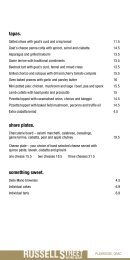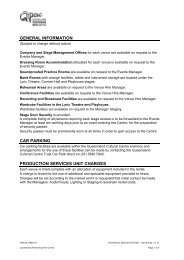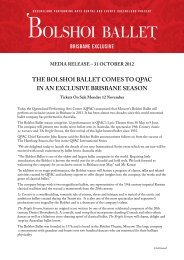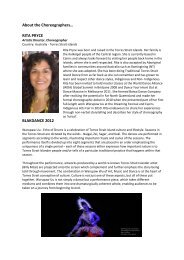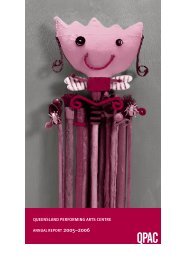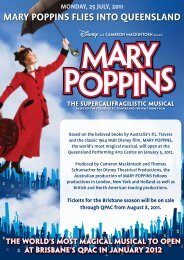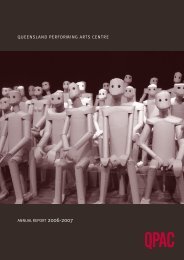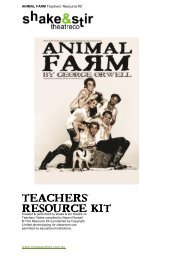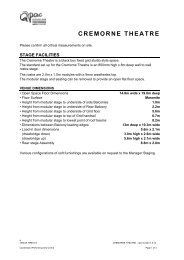Annual Report - QPAC
Annual Report - QPAC
Annual Report - QPAC
Create successful ePaper yourself
Turn your PDF publications into a flip-book with our unique Google optimized e-Paper software.
Industry partners<br />
Based on common goals and philosophies, <strong>QPAC</strong> has formed<br />
a range of performing arts industry partnerships to support<br />
industry development. Current industry partnerships that are<br />
already producing mutual benefits and supporting productive<br />
working relationships include affiliations with Harvest<br />
Rain Theatre Company, Southern Cross Soloists, Aboriginal<br />
Centre for the Performing Arts, State Library of Queensland,<br />
Brisbane Writers Festival and Queensland Conservatorium of<br />
Music.<br />
In 2009, <strong>QPAC</strong> became the primary performance venue for<br />
the popular Harvest Rain Theatre Company, one of Australia’s<br />
largest independent theatre companies. The relationship<br />
delivers a range of artistic and ancillary benefits for both<br />
organisations. For Harvest Rain, it provides the opportunity<br />
to expand their audience and gain skills through working in a<br />
larger venue alongside experienced Programming, Production<br />
and Marketing teams. For <strong>QPAC</strong>, the partnership provides<br />
access to a loyal, family audience, as well as providing<br />
additional musical product for our two smaller venues.<br />
Harvest Rain’s presentation of The Awfully Big Adventures<br />
of Peter Pan in January was one of the most successful<br />
productions in the company’s history, while their production<br />
of Joseph and the Amazing Technicolour Dreamcoat in March<br />
was so successful that a repeat season is scheduled for later<br />
in 2009.<br />
Creative development was high on the list of <strong>QPAC</strong>’s<br />
priorities this year. Potential new musicals, Isn’t it Romantic?<br />
The Songs of Rodgers and Hart and Suddenly Single had indevelopment<br />
showings in the Cremorne Theatre, while <strong>QPAC</strong><br />
also provided support for the creative development of Up<br />
Jumped the Devil, a music-theatre collaboration based on<br />
the songs of Nick Cave, interpreted and performed by Frank<br />
Theatre to be performed at <strong>QPAC</strong> in October 2009.<br />
Another example of industry support is the letter of<br />
agreement signed this year between the Aboriginal Centre<br />
for the Performing Arts (ACPA) and <strong>QPAC</strong>, which outlines<br />
areas of cooperation and joint interest. The agreement<br />
sets out commitments over a three-year period including<br />
opportunities for ACPA students to perform or undertake<br />
casual employment in the technical and service areas at <strong>QPAC</strong><br />
and to attend a wide range of professional performances and<br />
technical rehearsals.<br />
<strong>QPAC</strong> participates in major networks of performing arts<br />
centres throughout the region including the Australian<br />
Performing Arts Centres Association (APACA), Northern<br />
Australia Regional Performing Arts Association (NARPACA)<br />
and Association of Asia Pacific Performing Arts Centres<br />
(AAPAC). <strong>QPAC</strong> is also an active member of the industry<br />
group, OZPAC, which includes representatives from the<br />
Sydney Opera House, The Arts Centre Melbourne, Adelaide<br />
Festival Centre, Perth Theatre Trust and The Edge, Auckland.<br />
Networking with other performing arts centres provides<br />
a valuable forum to discuss issues of common interest<br />
including infrastructure assurance, research projects,<br />
enterprise bargaining agreements and the impacts of the<br />
economic downturn.<br />
International partnerships<br />
Attracting some 280 delegates from 25 countries, the 2008<br />
World Dance Alliance Global Summit was held in Brisbane<br />
in July, with <strong>QPAC</strong> contributing as a presentation partner of<br />
some of the events. The opening of the Summit was held in<br />
<strong>QPAC</strong>’s Cascade Court and featured inspiring performances<br />
by virtuosic didgeridoo musician and composer, William<br />
Barton, traditional and contemporary Aboriginal and Torres<br />
Strait Island dancers from Treading the Pathways national<br />
Indigenous program and traditional dance from Pacific Island<br />
Vou dancers.<br />
Delegates and audience members had the opportunity to<br />
participate in lively debate and exchange with key cultural<br />
thinkers and artists over four nights of the Summit’s Dance<br />
Dialogues: Conversations across cultures, artforms and<br />
practices in the Cremorne Theatre.<br />
Research<br />
<strong>QPAC</strong> takes a leading role in the advancement of research<br />
and debate that articulates the value of creative industries as<br />
fundamental drivers of economic growth.<br />
Sustaining Culture: The Role of Performing Arts Centres is<br />
a research project which focuses on the social, cultural and<br />
economic impacts of performing arts centres and their role<br />
in creating vibrant public spaces. Funded by an Australian<br />
Research Council (ARC) Linkage grant, Sustaining Culture<br />
brings together industry partners through the OZPAC network<br />
including <strong>QPAC</strong>, Sydney Opera House, The Arts Centre<br />
Melbourne and the Adelaide Festival Centre and researchers<br />
from Brisbane’s Griffith University.<br />
The project, which began in 2004, focuses on the impact of<br />
performing arts centres in the key areas of:<br />
• Participation – factors motivating audience participation<br />
and consumption<br />
• Performance – contribution to development of artists and<br />
companies<br />
• Partnership – engagement with arts organisations, other<br />
industries and government.<br />
The research findings, data and philosophies will provide<br />
enormous value to the centres in terms of operational<br />
delivery, communicating with government and reframing<br />
some of the thinking about the role and value of performing<br />
arts centres. The other significant outcome is the innovative<br />
use of research methodologies by the Griffith team and<br />
22



